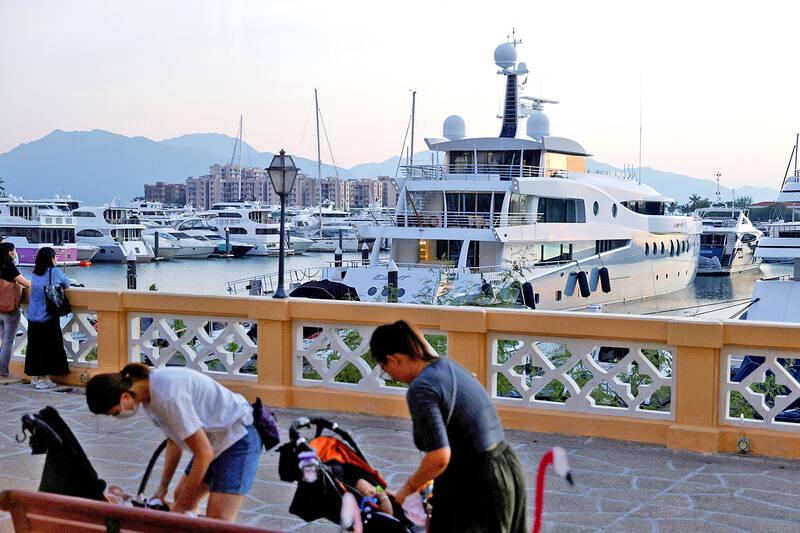China Evergrande Group (恆大集團) sold a luxury superyacht for about US$32 million earlier this year, said two sources, further shrinking the developer’s offshore assets as its cash crunch worsened and it scrambled to pull together a debt revamp plan.
Evergrande’s offshore bondholders are expected to sharpen their focus on offshore assets as the developer’s debt restructuring plan struggles with the founder now being investigated over suspected “illegal crimes.”
The debt restructuring process was further complicated this week after Evergrande said it was unable to issue new debt due to an investigation into its main China unit. Analysts have said delays to the debt restructuring raise the risk of the company being liquidated.

Photo: Reuters
Evergrande sold the 60m superyacht Event for US$32 million as part of a process to sell down non-core assets, said two sources with knowledge of the matter, declining to be named as the information is not yet public.
A third source with knowledge of the matter confirmed the sale of the yacht.
With Evergrande founder and chairman Hui Ka Yan (許家印) under investigation, analysts and investors are questioning who will run the company’s operations and what will happen to the offshore debt restructuring plan.
Evergrande is the world’s most indebted property developer with more than US$300 billion in total liabilities. Its financial woes, which first became public in 2021, has weighed on the Chinese economy as well as global markets.
After defaulting on its US dollar bonds in late 2021, Evergrande has been in the process of seeking creditors’ approval for its proposals to restructure offshore debt worth US$31.7 billion, which includes bonds, collateral and repurchase obligations.
Compared with its US$31.7 billion in total offshore liabilities, Evergrande has far fewer assets outside China. The sale of the Event means that the company’s foreign creditors will have fewer options in any potential liquidation process.
The Event was delivered in 2013 and was given the World Superyacht Award the following year, according to its Dutch manufacturer Amels’ Web site. It was estimated to be worth US$60 million in some Chinese media reports over the past two years.
Event was registered in Evergrande’s name, the sources said, which meant the proceeds would be returned to the developer, which has seen some of its own and the founder’s offshore assets divested or seized by lenders for loan defaults.
A Boeing private jet belonging to Evergrande was sold in July last year for US$100 million, the sources said.
Evergrande did not respond to a request for comment on the jet sale.
Lenders to Evergrande’s Hong Kong headquarters appointed a receiver in September last year to seize the building and tender it for sale. The property was valued from HK$8 billion to HK$9 billion (US$1 billion to US$1.15 billion) at the time.
Regarding the company’s remaining offshore assets and those of its founder, creditors would need to establish whether they have already been used as collateral to raise funds.
Foreign bondholders’ “ability to get to these [offshore] assets is a function of the legal claim — has he [Hui] pledged it?” One source involved in the Evergrande legal process said.

Taiwan Semiconductor Manufacturing Co (TSMC, 台積電) would not produce its most advanced technologies in the US next year, Minister of Economic Affairs J.W. Kuo (郭智輝) said yesterday. Kuo made the comment during an appearance at the legislature, hours after the chipmaker announced that it would invest an additional US$100 billion to expand its manufacturing operations in the US. Asked by Taiwan People’s Party Legislator-at-large Chang Chi-kai (張啟楷) if TSMC would allow its most advanced technologies, the yet-to-be-released 2-nanometer and 1.6-nanometer processes, to go to the US in the near term, Kuo denied it. TSMC recently opened its first US factory, which produces 4-nanometer

PROTECTION: The investigation, which takes aim at exporters such as Canada, Germany and Brazil, came days after Trump unveiled tariff hikes on steel and aluminum products US President Donald Trump on Saturday ordered a probe into potential tariffs on lumber imports — a move threatening to stoke trade tensions — while also pushing for a domestic supply boost. Trump signed an executive order instructing US Secretary of Commerce Howard Lutnick to begin an investigation “to determine the effects on the national security of imports of timber, lumber and their derivative products.” The study might result in new tariffs being imposed, which would pile on top of existing levies. The investigation takes aim at exporters like Canada, Germany and Brazil, with White House officials earlier accusing these economies of

Teleperformance SE, the largest call-center operator in the world, is rolling out an artificial intelligence (AI) system that softens English-speaking Indian workers’ accents in real time in a move the company claims would make them more understandable. The technology, called accent translation, coupled with background noise cancelation, is being deployed in call centers in India, where workers provide customer support to some of Teleperformance’s international clients. The company provides outsourced customer support and content moderation to global companies including Apple Inc, ByteDance Ltd’s (字節跳動) TikTok and Samsung Electronics Co Ltd. “When you have an Indian agent on the line, sometimes it’s hard

PROBE CONTINUES: Those accused falsely represented that the chips would not be transferred to a person other than the authorized end users, court papers said Singapore charged three men with fraud in a case local media have linked to the movement of Nvidia’s advanced chips from the city-state to Chinese artificial intelligence (AI) firm DeepSeek (深度求索). The US is investigating if DeepSeek, the Chinese company whose AI model’s performance rocked the tech world in January, has been using US chips that are not allowed to be shipped to China, Reuters reported earlier. The Singapore case is part of a broader police investigation of 22 individuals and companies suspected of false representation, amid concerns that organized AI chip smuggling to China has been tracked out of nations such